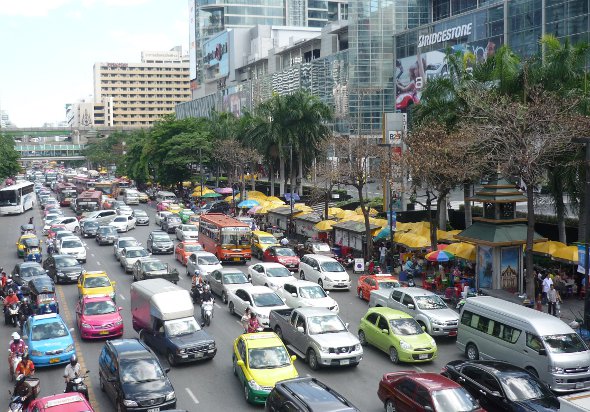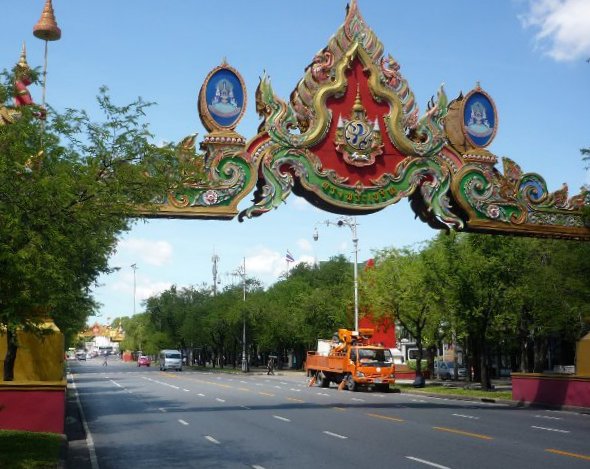Bangkok has a reputation for traffic jams and it’s something you should factor in to your travel plans if you need to get across the city to connect with flights, trains or buses.
Always allow plenty of time for travel in Bangkok, but especially if you are travelling during the morning peak (07.30 – 09.30) or evening rush hours (16.30 – 18.30). Heavy rain will also cause traffic to back up, particularly during the rainy season when flash floods are quite common as storm drains struggle to cope with the tropical downpours.
There are numerous local hotspots throughout the city where traffic tends to build up quickly although many of these are located in residential or industrial areas away from the main downtown areas of the Thai capital. However, traffic also gets very heavy during peak times along routes where overseas visitors are likely to be travelling such as Sukhumvit Road, Silom and Ratchaprasong Intersection (Siam Square) and Charoen Krung (New Road). Obviously, it’s impossible to predict traffic conditions on any given day because it will depend on accidents, road closures, construction work, rain etc. but there are some basic steps you can take to help you beat the worst of the Bangkok traffic.
 Afternoon traffic on Ratchadamri backing up to Ratchaprasong Intersection
Afternoon traffic on Ratchadamri backing up to Ratchaprasong Intersection
The Skytrain and metro networks are a great way to beat the Bangkok traffic. The downside is that both networks are limited in range and don’t cover all parts of the city. If you are going to or from Bangkok Suvarnabhumi airport consider using the airport rail link. It’s ultra-clean, quick and reliable but depending on where you are travelling to or from within the city it can still be less than ideal. In many cases the most convenient option is to take a taxi, especially if you are carrying heavy luggage or you are not close to a Skytrain or metro station.
Like any other major city around the world there are commercial areas and thoroughfares which are going to be busy at most times of the day, but it would also be misleading to say that the roads in Bangkok are permanently congested with traffic 24-hours a day, 7 days a week. Just to show you the other side of the coin, I took the photo below on a midweek morning in the Dusit area of Bangkok with barely a car in sight.
 No traffic on Ratchadamnoen Nok road, Bangkok
No traffic on Ratchadamnoen Nok road, Bangkok
If you take a taxi in Bangkok, it’s important to remember that they don’t want to be stuck in a traffic jam either. The driver is in contact via radio with other drivers and his control-room so he will be aware of any major hold-ups and will usually do his best to avoid them. Don’t assume taxis are trying to rip you off by taking you on the expressway which involves you paying a toll fare. The extra Baht paid on tolls will save you a lot of time.
From Siam, Silom and Sukhumvit it can take around 40 minutes to 1 hour on an average day to get to or from Bangkok Suvarnabhumi airport or Don Muang airport. If you get stuck in heavy traffic and are really unlucky with delays that can jump to as long as 1.5 to 2 hours so allow that amount of time to be on the safe side. If you are staying in the Chinatown area, Banglamphu district or areas close to the Grand Palace allow for an extra 15 to 20 minutes on top of the times already listed for travel to or from Suvarnabhumi airport.
Nobody can guarantee how long your individual journey will take in Bangkok on any given day, but potential delays and traffic congestion should definitely be taken into account when planning connections with flights and trains.